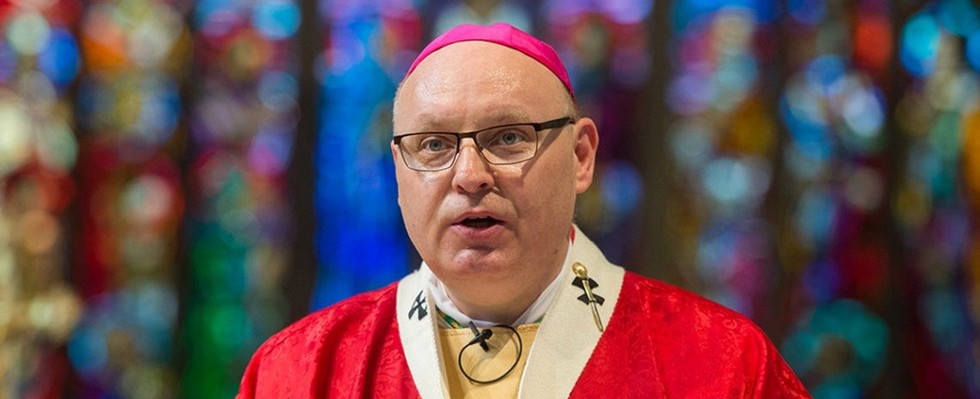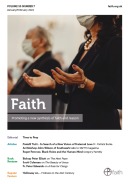Archbishop John Wilson talks to FAITH magazine
Joanna Bogle talks to Archbishop John Wilson about his first year as Archbishop of Southwark.
JB: You became Archbishop of Southwark, and within a year, you were in the nationwide lockdown for the Coronavirus – all normal events and activities cancelled, churches and schools closed. And you had to preside over the funeral of your predecessor under these unusual circumstances. Tell us a bit about how that has been.
JW It was a great surprise to be appointed as Archbishop of Southwark after three and a half years as an Auxiliary Bishop in the Archdiocese of Westminster. Hesitantly, I accepted in faith, trusting the Lord and desiring to serve His Church and His people. I never imagined this would be how my vocation would unfold.
The first year was always going to be a steep learning curve, but the way things progressed has been extraordinary. After my installation last July, I began to get a sense of the Archdiocese and its clergy, religious, and laity. I also started visiting parishes every Sunday. Unfortunately, lockdown put pay to that, although I was able to live-stream a Sunday Mass from St George’s Cathedral which helped me keep in touch, along with video messages to different groups within the Archdiocese. I also wrote to the clergy every week, mainly to try and encourage them spiritually as well as providing updates on the situation in terms of the implications for the Church. Thankfully, in February 2020 I was able to hold three overnight meetings with the clergy from the three pastoral areas of the Archdiocese. This gave a chance to introduce myself and share something of what I understand to be our mission moving forward together.
At the end of March this year, just as the lockdown began, I presided over the funeral of my predecessor Archbishop Peter Smith. He had only retired the previous July and sadly died after just a matter of months. We were a small number at his funeral – the priests who live on site at the Cathedral and a few family members. He was very much a ‘no fuss’ kind of person and the simplicity and dignity of the liturgy reflected his gentle straightforward faith. It was an honour to be able to accompany him in his last days and to his resting place in the Cathedral vault. The Cathedra sits above the underground chamber where the former bishops and archbishops are buried. Every time I sit there it’s a reminder that life is short and we have to make it count for the Lord.
JB: And your own story. When and how did you decide to become a priest?
JW: I became a Catholic when I was 16 years old. I was baptised as a baby in the Church of England, but it was through joining a Church choir that my faith came to life. I gradually came to appreciate the beauty of the Eucharist and this drew me to the Catholic Church. I was given such good example by the Anglican clergy that I met. I think my vocation first sparked because of their faith and witness.
As I came closer to the Catholic Church, and eventually became a Catholic, the sense of a call to the priesthood grew stronger. While at university in Leeds, I approached the Diocese of Leeds and Bishop David Konstant accepted me as a seminarian. I was ordained 25 years ago this year, on 29 July 1995, the Feast of St Martha.
JB: We clearly have a problem with communicating the Faith. Most of the pupils at our Catholic secondary schools do not go to Sunday Mass. Even if they have been attending when younger, most stop by the age of twelve. How can we change this?
JW: Every crisis in the Church is ultimately a crisis of faith. Therefore, we need to do everything we can to teach, strengthen, and nurture the life of faith at every stage of life. In Familiaris Consortio, St John Paul II wrote ‘the future of humanity passes by way of the family.’ Catholic schools have a vital role to play in passing on the faith to young people. With this we also need to help families build up homes of faith. I think family apostolate and the formation of Catholic teachers are essential, alongside good parish youth outreach ministry. We who are entrusted with the ministry of passing on the faith can only do so if that faith is alive within us. Formation of families, teachers and catechists is vital.
JB: For many people in Britain the only thing they know about the Church is that it’s against abortion… or about some scandals. How can we communicate some basic truths – about God and why we are all here, and the joy of the Christian message? Can the internet help? And/or is there room for some street evangelisation, or old-style mission work?
JW: Pope Francis calls every Catholic to be a missionary disciple. Other Popes before him have also stressed that to evangelise, we need to be evangelised. Let’s put this another way. If you want others to love the Lord Jesus and His Church, you have to love the Lord Jesus and His Church. In St John Henry Newman’s words: ‘And I hold in veneration, for the love of him alone, Holy Church as his creation, and her teachings as his own.’ The first step in the joyful proclamation of the Good News of Salvation in Jesus Christ is to be witnesses whose hearts have been captured by the Lord and who are ablaze with the Holy Spirit.
It’s interesting at the Rite of Election each year that so many people become Catholics because of another Catholic – at work, or in their family, or through a friendship or social connection. Personal witness can draw people to the Lord Jesus through His Church. Wouldn’t it be wonderful if we all set ourselves the mission of bringing at least one other person to Christ in His Catholic Church every three years. Joyful Catholics make for a joyful, attractive faith. As the saying goes, we were not baptised in vinegar, but water from the wellspring of salvation.
Modern media and the internet have a necessary part to play in evangelisation today. We need to use the internet for Christ, to teach the Catholic faith and give testimony to the truth of who God really is and who we really are. We need to help people meet Christ: in their hearts though an inner spiritual life of prayer, and in their minds through a catechetical and intellectual formation, not least to counter distorted or unreasonable supposed counter arguments to Catholicism. The history of the spread of the Catholic faith demonstrates the courageous creativity of our forebears. Through personal witness, through invitation, through dialogue and explanation, as well as through every form of evangelisation – on the streets, in missions, through festivals, processions, pilgrimages, and movements – we are all necessary to build up the Body of Christ.
JB: Who are the saints and heroes that have inspired you – now or at other stages of your life? Saints of old? Modern heroes like St John Paul? Any personal mentors among family or friends?
JW: There are so many! Since childhood I have met so many people – clergy, religious, and laity – who have inspired me. When I was received into the Church a religious sister I didn’t know came to me at the sign of peace and put her rosary into my hand. I was fortunate to grow up with St John Paul II as a powerful figure, whom I met on a number of occasions. I also met Mother, now Saint Teresa of Calcutta which had a profound effect on me. I wrote to tell her and I cherish the letter I received back from her. The English Martyrs, St Pio of Pietrelcina, St Bernadette of Lourdes, St Josemaria Escriva, St Oscar Romero, Blessed Charles de Foucauld, Blessed Pier Giorgio Frassiati, Jacques Fesch, Caryll Houselander, Henri Nouwen - the list goes on.
I have also been so inspired by parishioners in the parishes where I have served: faithful and devout Catholics who live their faith, through all the ups and downs of life, sometimes with largely unknown heroism, giving of themselves for Christ and for others.
JB: There often seems to be a problem with clergy morale – and the lockdown probably hasn’t helped. Some people talk about simply “managing decline”. But do you see some alternatives?
JW: There is a simple equation that I have shared with the clergy of Southwark since I came here: a holy priest makes for a holy Church; a happy priest makes for a happy Church; and a loved priest makes for a loving Church. No deacon, priest, or Bishop is ordained to ‘manage decline.’ With our baptised brothers and sisters, we are ordained to make disciples for Christ.
In our time and place, we are charged to ensure that our grassroots parish communities are active in evangelisation and mission. This takes many forms, more than we are often currently willing to consider. It means looking at how we welcome people to our parishes, how we celebrate the liturgy, how we nourish our people spiritually and catechetically, how we serve and reach out to the weakest and the poorest. We need to rediscover the treasure of our faith and represent them for today. It’s not so much constantly thinking up new ideas, even less so gimmicks. It’s about delighting in our Catholic faith and rediscovering, personally and as parish communities, a fresh desire to be salt to the earth and light to the world.
JB: Finally: you have some new young priests in Southwark, and some men in training too. What is your message to them?
JW: I was overjoyed to ordain four new priests for Southwark this past summer and I am delighted that we have candidates preparing for ordination at various stages of their formation. If you want to read the ordination homilies go to: www.archbishopjohnwilson.com My message to them is this: The priesthood is a beautiful vocation, lived in and through Christ’s Body with His people. However, there is no outer life worth having, not even the outer life of the priesthood, unless we have an inner life, alive and in love, with Jesus Christ. We cannot become priests unless we are first disciples. We cannot continue as priests, without, each day, remaining disciples. Those of us called to the priesthood, called to lead others in the Church, must - first, last, and always – follow Christ and be faithful to Him.
The priesthood offers the most wonderful adventure of a life lived in selfless service. By remaining close to the Lord Jesus, especially in the Blessed Sacrament, we will not just be given all the graces we need, but more than we could ever imagine, with an outpouring of out-of-this-world joy on top for good measure. I love being a priest and I wouldn’t swap it for anything.






